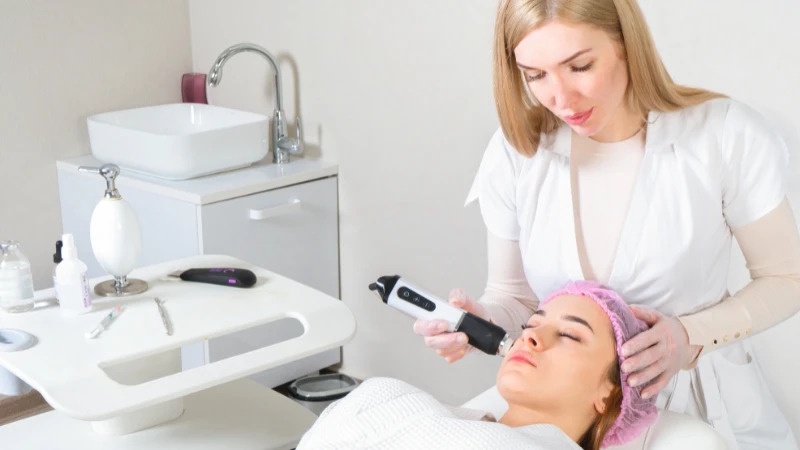Introduction
Dermatology, a branch of medicine focusing on the skin, holds significant importance in both medical and cosmetic realms. It deals with various conditions that affect the skin, hair, and nails. While some skin issues may seem minor, others can significantly impact an individual's quality of life. Understanding common dermatological conditions and their treatments is crucial for effective management and care.
Common Dermatological Conditions
Acne:
One of the most prevalent skin conditions, acne affects millions worldwide, predominantly adolescents and young adults. It occurs when hair follicles become clogged with oil and dead skin cells, leading to pimples, blackheads, and cysts. While acne can cause physical discomfort, it also affects self-esteem and mental health. Treatment options include topical medications, oral antibiotics, hormonal therapy, and isotretinoin for severe cases.
Eczema (Atopic Dermatitis):
Eczema is a chronic inflammatory skin condition characterized by red, itchy rashes. It often develops in childhood but can persist into adulthood. Triggers may include allergens, irritants, stress, and climate changes. Treatment involves moisturizers to keep the skin hydrated, topical corticosteroids to reduce inflammation, antihistamines to relieve itching, and immunomodulators for severe cases.
Psoriasis:
Psoriasis is a chronic autoimmune condition that causes rapid skin cell growth, resulting in thick, scaly patches. These patches may be itchy, painful, and prone to bleeding. Psoriasis can affect any part of the body and is associated with other health conditions such as arthritis and cardiovascular disease. Treatment includes topical corticosteroids, phototherapy, oral medications, and biologic agents for moderate to severe cases.
Skin Cancer:
Skin cancer, including melanoma, basal cell carcinoma, and squamous cell carcinoma, is a significant concern globally. UV exposure from the sun and artificial sources is the primary risk factor for developing skin cancer. Early detection and treatment are crucial for successful outcomes. Treatment options depend on the type and stage of cancer and may include surgery, radiation therapy, chemotherapy, immunotherapy, and targeted therapy.
Rosacea:
Rosacea is a chronic inflammatory skin condition characterized by facial redness, visible blood vessels, bumps, and sometimes eye irritation. Triggers such as sunlight, spicy foods, alcohol, and stress can exacerbate symptoms. Treatment involves avoiding triggers, gentle skincare, topical medications (such as metronidazole or azelaic acid), oral antibiotics, and laser therapy for visible blood vessels.
Treatment Modalities in Dermatology
Topical Treatments:
Topical medications are often the first line of treatment for various dermatological conditions. These formulations include creams, lotions, gels, and ointments applied directly to the skin. Topical corticosteroids reduce inflammation and itching, while retinoids regulate cell turnover and unclog pores. Other topical treatments include antimicrobials, calcineurin inhibitors, and keratolytics.
Phototherapy:
Phototherapy, also known as light therapy, involves exposing the skin to specific wavelengths of ultraviolet (UV) light to treat various skin conditions. UVB phototherapy is commonly used for psoriasis, eczema, vitiligo, and other conditions. Narrowband UVB therapy and PUVA (psoralen plus ultraviolet A) are two common phototherapy techniques used in dermatology clinics.
Systemic Medications:
Systemic medications are taken orally or by injection and are used to treat dermatological conditions that are widespread or unresponsive to topical treatments. Oral antibiotics are prescribed for acne and rosacea, while immunosuppressants and biologic agents are used for autoimmune conditions like psoriasis and eczema. Isotretinoin, a potent oral retinoid, is reserved for severe nodular acne unresponsive to other treatments.
Surgical Interventions:
Surgical interventions are necessary for the diagnosis and treatment of skin cancers and certain benign growths. Mohs micrographic surgery is a precise technique used to remove skin cancer layer by layer, minimizing damage to healthy tissue. Other surgical procedures include excision, cryotherapy, curettage, and laser surgery, depending on the condition and its location.
Laser Therapy:
Laser therapy is a versatile treatment modality used in dermatology for various purposes, including hair removal, tattoo removal, scar reduction, and skin rejuvenation. Different types of lasers target specific skin structures and pigments, delivering precise energy to achieve desired outcomes with minimal downtime and side effects.
Conclusion
Medical dermatology encompasses a broad spectrum of conditions, ranging from common issues like acne and eczema to serious concerns such as skin cancer. Effective management requires a comprehensive understanding of each condition's causes, triggers, and treatment options. Dermatologists play a vital role in diagnosing and treating skin ailments, improving patients' quality of life and overall well-being. By staying informed about common dermatological conditions and their treatments, individuals can take proactive steps to maintain healthy skin and seek timely medical intervention when needed.
Discover premier medical dermatology services tailored to enhance your skin's health and vitality at Embrace Skin. Our expert dermatologists specialize in diagnosing and treating a wide range of skin conditions with the highest quality care. From acne and eczema to skin cancer screenings and cosmetic procedures, we prioritize your well-being and confidence. Trust Embrace Skin for comprehensive solutions that prioritize your skin's health and radiance.


No comments yet